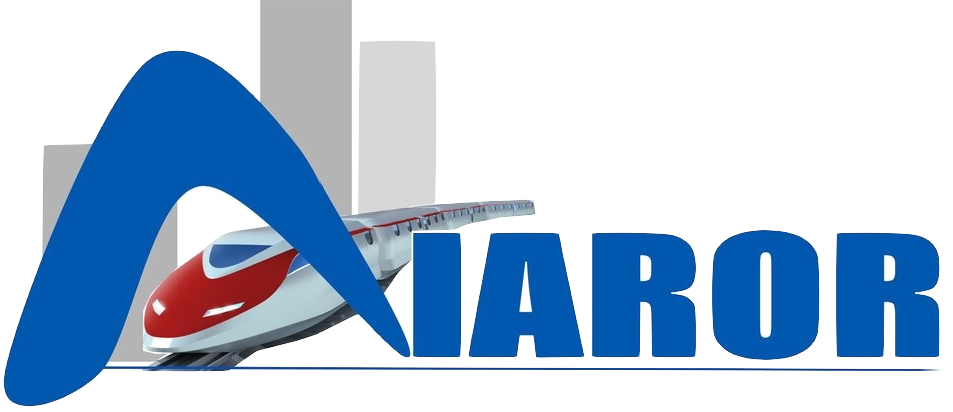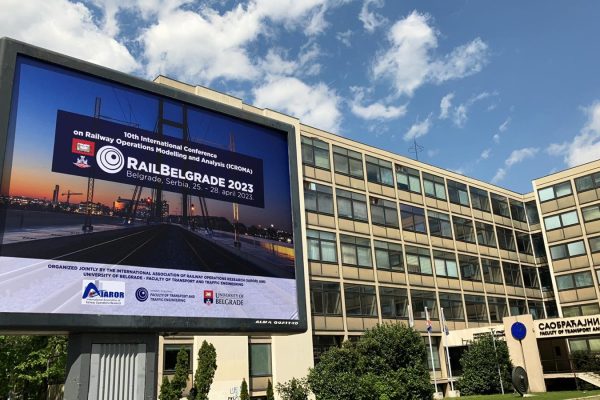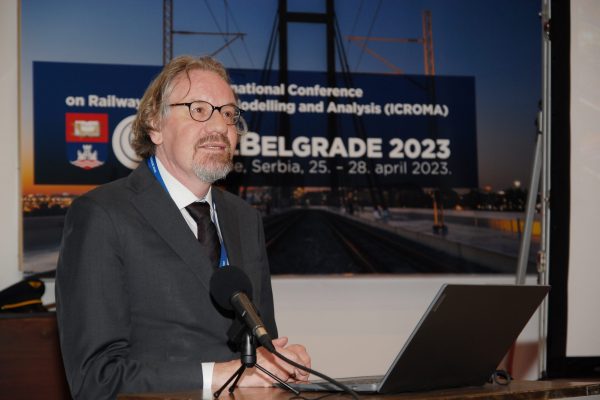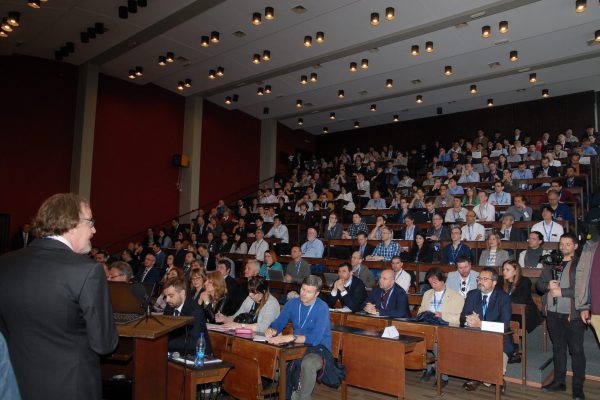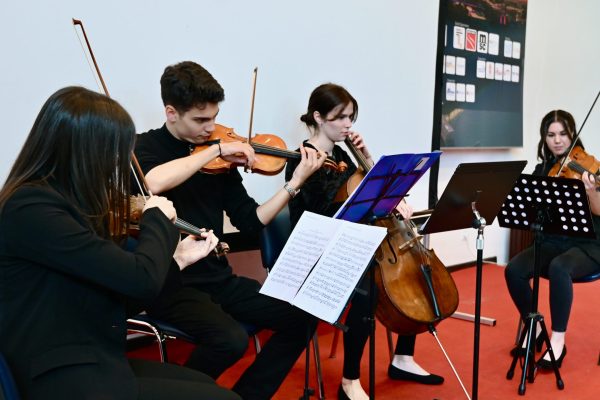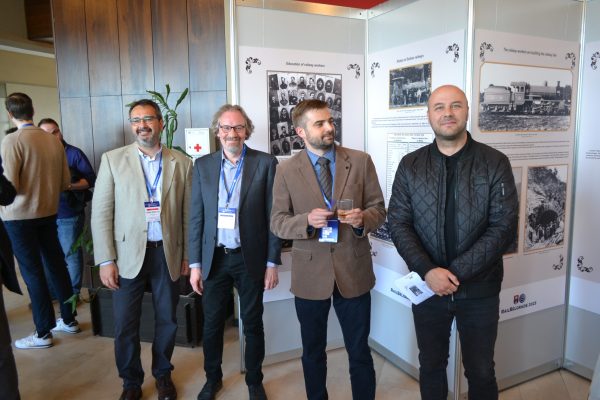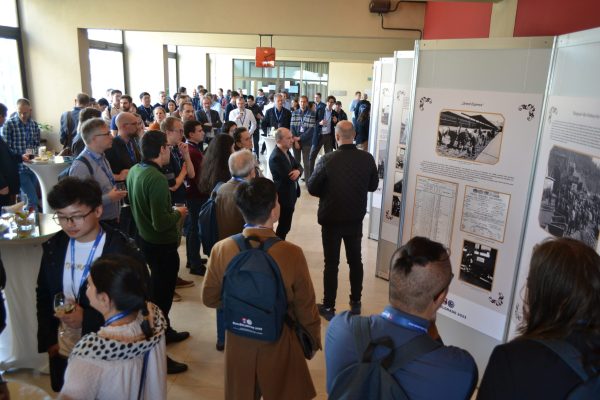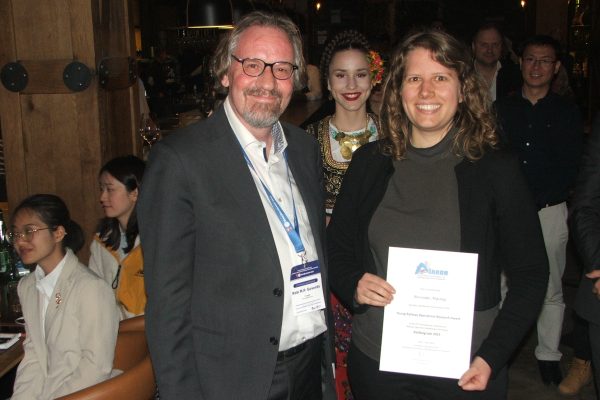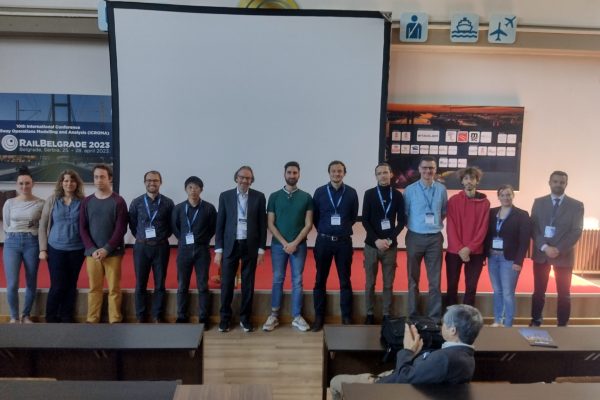The 10th International Conference on Railway Operations Modelling and Analysis (ICROMA), RailBelgrade 2023, was held at the University of Belgrade – Faculty of Transport and Traffic Engineering on April 25-28, 2023.
RailBelgrade 2023 was co-organized by IAROR and the University of Belgrade – Faculty of Transport and Traffic Engineering (UB-FTTE). The Organizing Committee was composed of
- Rob Goverde, Delft University of Technology (President of IAROR)
- Francesco Corman, ETH Zürich (Vice-President of IAROR)
- Ivan Belošević, University of Belgrade (Conference Chair)
- Sanjin Milinković, University of Belgrade (Conference Program Chair)
- Vladan Đokić, University of Belgrade (Rector of UB)
- Nebojša Bojović, University of Belgrade (Dean of UB-FTTE).
The Organizing Committee was supported by a Local Organizing Committee of 15 members from UT-FTTE and Serbian Railways, and a Scientific Advisory Committee consisting of 50 members from the IAROR Board and additional IAROR members, see the committee member lists at the end. Furthermore, the submitted papers were reviewed by a group of 132 reviewers, including the SAC and additional IAROR members. Thanks to all these volunteers, who made RailBelgrade 2023 a success!
139 papers were submitted of which 113 were accepted for oral presentations (109 were actually presented), 12 accepted for a poster session (10 attended), and 14 were rejected. The 125 accepted papers contained 113 research papers and 12 industrial paper. Overall, RailBelgrade had 119 presenters from 20 countries, and 219 participants from 31 countries.
The 10th ICROMA RailBelgrade 2023 lasted 3 days plus a pre-conference mini course. The programme included
- 3 keynote speeches by
- Carlo Mannino (SINTEF) on MILP Reformulations for Train Timetabling and Dispatching: Recent Advancements
- Milan Janić (University of Belgrade) on High-Speed Rail Transport Systems: Analysing, Modelling, and Evaluating
- Nikola Bešinović (TU Dresden) on Resilience in Railway Transport Networks: From Concepts to Applications
- 33 sessions in 11 parallel sessions with in total 109 presentations
- 1 poster session with 10 posters
- A siding programme with company presentations and panel discussion
- Conference dinner at the National Cuisine Restaurant Bela Reka
- Minicourse with 4 invited speakers by
- Dennis Huisman (Erasmus University Rotterdam) on Crew Scheduling
- Tyler Dick (University of Texas at Austin) on Capacity and Performance of Freight Railway Yards and Terminals
- Carlos Azevedo (Technical University of Denmark) about Multimodal Transportation System Simulation
- Sanjin Milinkovic (University of Belgrade) about Railway Operations Modeling with Petri Nets.
- Technical visit I: Belgrade Central Station and Blue Train interior tour
- Technical visit II: Nelt’s Dry Port & Logistics Hub
The Young Railway Operations Research Awards were awarded to
- 1st prize: Marta Leonina Tessitore (Roma Tre University) for her paper ‘On the fragility of a train timetable’
- 2nd prize: Berenike Masing (Zuse Institute Berlin) for her paper ‘Periodic timetabling with integrated track choice for railway construction sites’
- 3rd prize: Alex Cunillera (Delft University of Technology) for his paper ‘Coasting advice based on the analytical solutions of the train motion model’.
The Best Papers of RailBelgrade 2023 were selected as
- Marta Leonina Tessitore, Giorgio Sartor, Marcella Samà, Carlo Mannino and Dario Pacciarelli. On the fragility of a train timetable.
- Berenike Masing, Niels Lindner and Christian Liebchen. Periodic timetabling with integrated track choice for railway construction sites.
- Alex Cunillera, Harm Jonker, Gerben Scheepmaker, Wilbert Bogers and Rob Goverde. Coasting advice based on the analytical solutions of the train motion model.
- Christopher Szymula, Nikola Besinovic and Karl Nachtigall. Demand-based capacity assessment using mixed integer programming.
- Fangsheng Wang, Pengling Wang, Zixuan Zhu, Xiaofang Xiao and Ruihua Xu. Robust optimization of train timetable with short-turning strategy considering uncertain passenger demand and vehicle selection.
- Jakob Geischberger, Alessa Isberner and Norman Weik. Optimizing rollout strategies for migration to moving block signaling: a MINLP-based approach for on-board TIM technology.
- Marko Kapetanović, Alfredo Núñez, Niels van Oort and Rob Goverde. Vehicle-to-grid concept for hydrogen fuel cell hybrid-electric regional trains.
- Jiaxi Zhao and C. Tyler Dick. Predicting and measuring service disruption recovery time in railway gravity hump classification yards.
- Farid Arthaud, Guillaume Lecoeur and Alban Pierre. Transformeurs à Grande Vitesse.
- Leo D’Amato, Federico Naldini, Valentina Tibaldo, Vito Trianni and Paola Pellegrini. Designing self-organizing railway traffic management.
- Nadine Friesen, Tim Sander, Karl Nachtigall and Nils Nießen. Modelling time in the timetable-based railway network design problem.
The authors of these papers were invited to submit their paper to the Special Issue on Best Papers of RailBelgrade 2023 in the Journal of Rail Transport Planning & Management.
Local Organizing Committee
- Nebojša Bojović (UB-FTTE)
- Ivan Belošević (UB-FTTE)
- Sanjin Milinković (UB-FTTE)
- Stanko Bajčetić (UB-FTTE)
- Biljana Gordić, Serbian Railways a.d.
- Milivoje Ilić (UB-FTTE)
- Miloš Ivić (UB-FTTE)
- Predrag Jovanović (UB-FTTE)
- Dragana Macura (UB-FTTE)
- Miloš Milenković (UB-FTTE)
- Slobodan Mitrović (UB-FTTE)
- Norbert Pavlović (UB-FTTE)
- Nikola Stojadinović (UB-FTTE)E
- Slavko Vesković (UB-FTTE)
- Predrag Živanović (UB-FTTE).
Scientific Advisory Committee (SAC)
- Abhyuday, Indian Railways Institute of Mechanical & Electrical Engineering (India)
- Borna Abramović, University of Zagreb (Croatia)
- Ivan Belošević, University of Belgrade (Serbia)
- Nikola Bešinović, Technical University Dresden (Germany)
- Markus Bohlin, Mälardalen University (Sweden)
- Nebojša Bojović, University of Belgrade (Serbia)
- Francesco Corman, Swiss Federal Institute of Technology (Switzerland)
- Andrea D’Ariano, University of Rome Tre (Italy)
- Stéphane Dauzère-Pérès, Mines Saint-Étienne (France)
- Tyler Dick, University of Texas at Austin (USA)
- Rob Goverde, Delft University of Technology (The Netherlands)
- Ingo Hansen, Delft University of Technology (The Netherlands)
- Steven Harrod, Technical University of Denmark (Denmark)
- Yung-Cheng (Rex) Lai, National Taiwan University (Taiwan)
- Alex Landex, Ramboll Group (Denmark)
- Christian Liebchen, Technical University of Applied Sciences Wildau (Germany)
- Carlo Mannino, SINTEF (Norway)
- Marin Marinov, Aston University (United Kingdom)
- Nikola Marković, University of Utah (USA)
- Peter Marton, University of Žilina (Slovakia)
- Giorgio M. Medeossi, TRENOlab (Italy)
- Lingyun Meng, Beijing Jiaotong University (China)
- Sanjin Milinković, University of Belgrade (Serbia)
- Andrew Nash, St. Pölten University of Applied Sciences (Austria)
- Florin Codrut Nemtanu, Polytechnic University of Bucharest (Romania)
- Lei Nie, Beijing Jiaotong University (China)
- Otto Anker Nielsen, Technical University of Denmark (Denmark)
- Nils Nießen, RWTH Aachen (Germany)
- Andreas Oetting, Technical University of Darmstadt (Germany)
- Dario Pacciarelli, University Roma Tre (Italy)
- Joern Pachl, Technical University of Braunschweig (Germany)
- Paola Pellegrini, University Gustave Eiffel (France)
- Anders Peterson, Linköping University (Sweden)
- Christos N. Pyrgidis, Aristotle University of Thessaloniki (Greece)
- John Preston, University of Southampton (United Kingdom)
- Stefano Ricci, University of Rome La Sapienza (Italy)
- Clive Roberts, University of Birmingham (United Kingdom)
- Joaquin Rodriguez, University Gustave Eiffel (France)
- Bernhard Rüger, Vienna University of Technology (Austria)
- Ismail Sahin, Yildiz Technical University (Turkey)
- Thomas Schlechte, LBW Optimization GmbH (Germany)
- Andreas Schoebel, OpenTrack Railway Technology (Switzerland)
- Aleksander Sładkowski, Silesian University of Technology (Poland)
- Svetla Stoilova, Technical University of Sofi a (Bulgaria)
- Jaromír Široký, University of Pardubice (Czech Republic)
- Norio Tomii, Nihon University (Japan)
- Pieter Vansteenwegen, University of Leuven (Belgium)
- Alex Wardrop, TTG Transportation Technology (Australia)
- Chao Wen, Southwest Jiaotong University (China)
- Thomas White, Transit Safety Management (USA).
